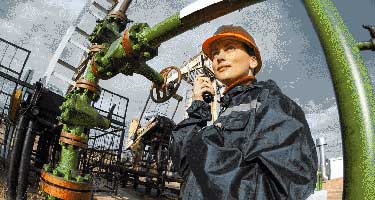Solutions to Waste Management Issues For Oil & Gas Companies
Waste management compliance is important in every industry. The oil and gas industry, in particular, has a strong risk of waste emissions. Therefore, it’s vital for companies to understand how to manage drilling waste management, improve disposal of unwanted materials, and decrease unnecessary waste across the organization.
Why Waste Management is Important in the Oil and Gas Industry
Waste management in the oil and gas industry is critical for a number of reasons.
1. Protect Natural Resources
Oil and natural gas are vital natural resources. However, they are limited. By improving waste management practices, oil and gas companies can protect those natural resources and help them last longer.
2. Reduce Pollution
The oil and natural gas industries may emit a number of pollutants, including methane, VOCs, and pollutant chemicals known or suspected to cause cancer. By improving waste management strategies, the oil and gas industry can decrease the pollutants released by its activities.
3. Save Money and Resources
By improving waste management practices, many oil and gas companies find that they are able to protect money and resources, a critical element in the oil industry as prices remain volatile. In many cases, decreasing waste can help produce more output from the same resources the company already has. Or, in many cases, they can decrease the costs necessary to produce the same outcome.
What are the 4 Types of Waste Management?
There are four main types of waste management practices. We’ve outlined the ones that most often impact the oil and gas industry.
1. Municipal Solid Waste
Municipal solid waste includes the general waste types produced by any business or, in many cases, homes. These may include paper and plastic products, metal and glass products, and other wastes generated from oil and gas containers. The oil and gas industry may generate solid wastes during the exploration process, due to the equipment used, during transport, or while storing oil and gas for future consumption.
2. Industrial Solid Waste
Industrial solid waste can take a number of forms that may include higher overall levels of toxicity. In industry in general, including the oil and gas sector, many businesses use more dangerous chemicals and solvents than private homeowners typically use. In the oil and gas industry, that may mean different types of waste depending on the stage of the process.
For example, oil and gas exploration companies often deal with drilling fluids and cuttings that may be contaminated with chemicals. As a result, it’s impossible to return them back to the general water supply or to store them with general waste.
3. Agricultural Waste and Residue
Most of the time, the oil and gas industry does not have to worry about agricultural waste, which is produced due to the byproducts of livestock or farming. However, residue from oil and gas production efforts may mingle with nearby agricultural waste in some settings.
4. Hazardous Waste
The oil and gas industry may produce a great deal of hazardous waste during the normal course of operations. Those normal processes may lead to wastes that include:
- Arsenic
- Lead
- Chromium
- Mercury
- Cadmium
- Benzene
All these substances can be considered toxic when exposure occurs in high quantities. They may have an impact both on the environment and on the people interacting with them on a regular basis. As a result, the oil and gas industry must take several steps to ensure the proper disposal of those dangerous substances.
Waste Disposal Regulations in the Oil and Gas Industry
The disposal of waste in the oil and gas industry is regulated heavily at both the federal and state levels. Because of the heavy amount of waste produced by the drilling and production processes, oil and natural gas companies may need to carefully consider their environmental impact before, during, and after drilling.
The RCRA
The Resource Conservation and Recovery Act helps regulate underground storage tanks and the disposal of solid or hazardous waste. It creates regulations at the federal level and encourages states to create their own individual regulations.
Hazardous waste, under the RCRA, may include:
- Ignitable waste
- Corrosive waste
- Toxic waste
- Acute hazardous waste
- Reactive waste
The RCRA has a “cradle to grave” regulation scheme that regulates the production, use, and disposal of hazardous waste at every stage of the process. At the disposal level, it prohibits anything that may discharge, inject, spill, or leak into the air, water, or ground. That means that hazardous waste from oil and gas production needs to be disposed of in proper landfills, rather than in open dumps.
State Permits
In most states, oil and gas companies, like other companies, must have a state permit to dispose of hazardous waste. Each state has the right to decide what those permits include and how they are created. In many cases, oil and gas companies, due to their economic and energy-related necessity, are exempt from many of the processes required of other businesses and industries. However, each state sets its own regulations, which may vary dramatically from one to the next.
Voluntary Management Practices
The EPA also issues specific voluntary management
- Liners
- Leak detection systems
- Maintaining and using a pit for waste disposal
- Regulations for the transportation of waste
- Secondary protection of water tanks used in the cooling or production process
By following the best practices for voluntary management, oil and gas companies can substantially reduce the environmental impact due to hazardous waste produced throughout the process. Following those best practices can also help protect the company in the future.
Waste management for the oil and gas industry can be particularly challenging. By following essential industry regulations and best practices, however, oil and gas companies can reduce their impact, decrease waste, and ultimately create a more successful return on their investment.

Stay in Touch!
About GoCanvas
GoCanvas® is on a mission to simplify inspections and maximize compliance. Our intuitive platform takes care of the administrative tasks, freeing our customers to focus on what truly matters – safeguarding their people, protecting their equipment, and delivering exceptional quality to their customers.
Since 2008, thousands of companies have chosen GoCanvas as their go-to partner for seamless field operations.

Check out even more resources

Manage Risk for Oil and Gas Companies With a Risk Assessment Checklist
Today, the challenges faced by the oil and gas industry are considerable. Effective business leaders and managers must thoroughly understand them to determine…

5 Tips to Improve How Your Business Collects Data
Focusing on your business practices for data collection will help you scale your business growth and productivity. Here are some best practices tips to improve…

4 Ways Big Data is Transforming Oil and Gas
Oil and gas companies are getting smart about using the data they collect to gain insights and manage people, equipment, and worksites more effectively…